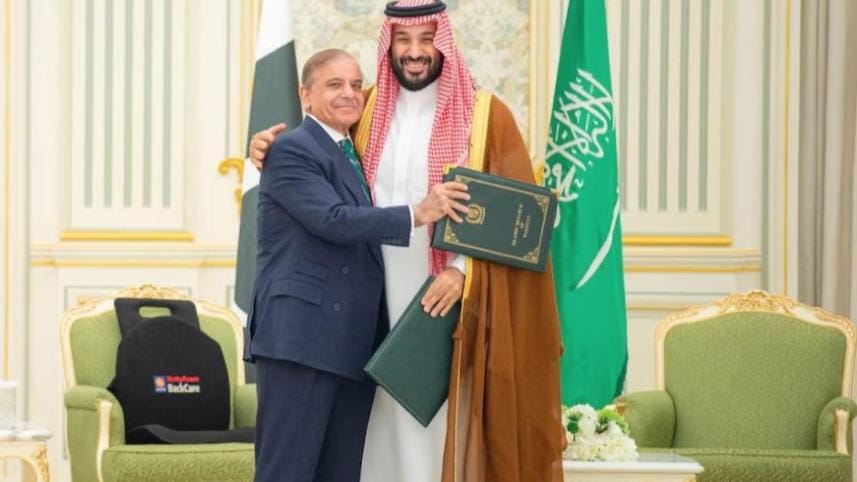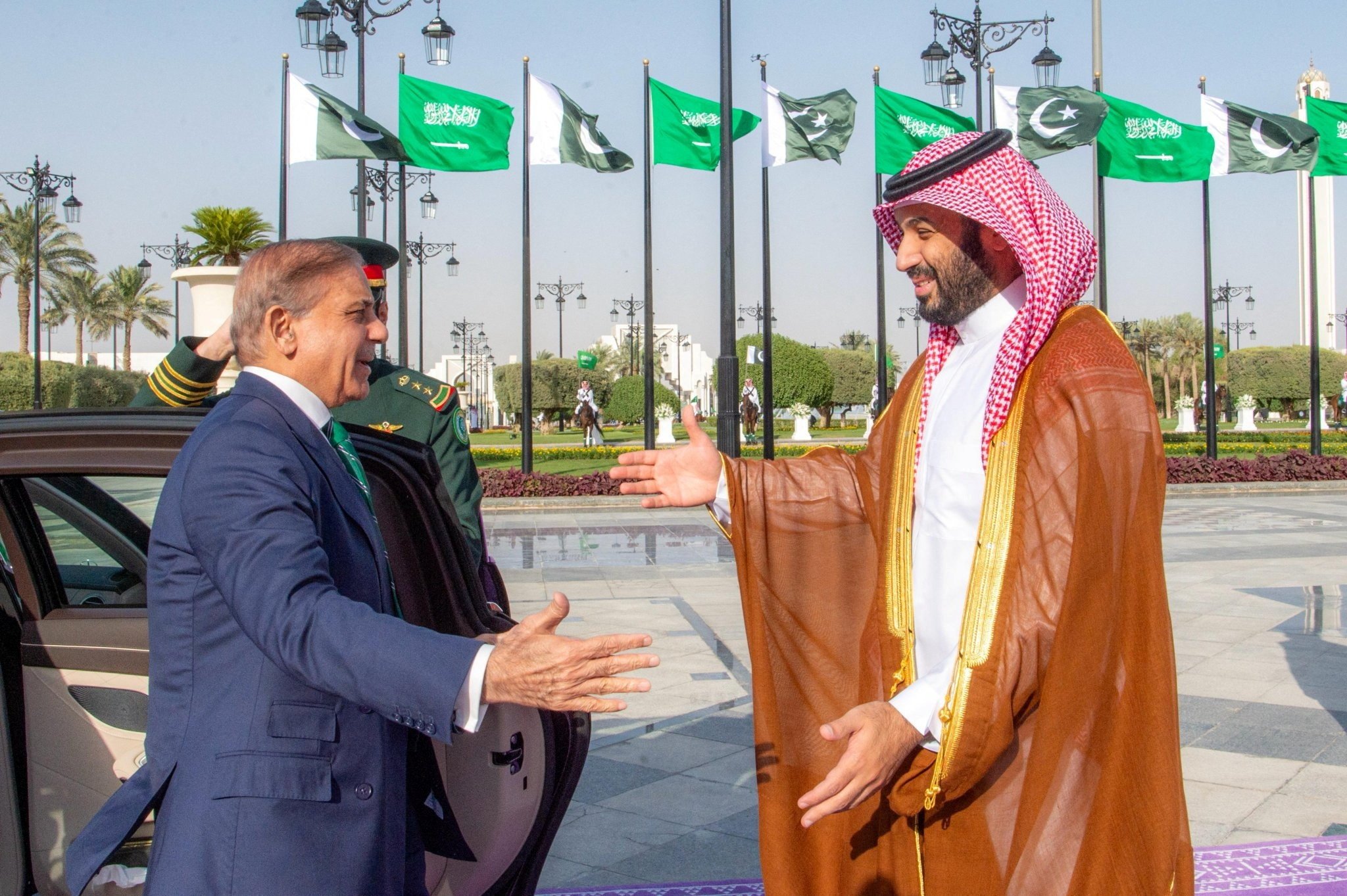Riyadh-Islamabad axis can reshape the geopolitical chessboard

Recently, a semi-seismic shift has occurred in the landscape of geopolitics, although it arrived not with a bang, but rather quietly. On September 17, Pakistan and Saudi Arabia signed a defence treaty called the Strategic Mutual Defence Agreement(SMDA), which sent reverberations from Washington to New Delhi and Tel Aviv. Crucially, the pact contains a clause stating that any attack on one signatory will be considered an attack on both. This mutual defence commitment—mirroring Article 5 of the North Atlantic Treaty (Nato Charter)—marks the birth of a potentially powerful new axis, signalling a bold commitment to strategic independence from traditional alliances.
The question is: what prompted this alliance, and what does it mean for the current global and regional order? The first part of the answer, according to a growing consensus among analysts, lies not in Riyadh or Islamabad, but in the smoke-filled skies of Qatar's Doha.
It relates to Israel's audacious attack on Qatar on September 9, aimed at assassinating Hamas negotiators, which drew swift international condemnation for violating Qatar's sovereignty. The strike itself was not the main trigger, however. It was the subsequent silence from Washington. Qatar is a major non-Nato ally of the US and home to its largest military base in the Middle East. Yet, when Israel, perhaps the closest US ally, conducted an attack on Qatar's soil, the US seemingly stood aside, expressing unhappiness only.
For Saudi Arabia and other Gulf countries, a chilling realisation dawned: their decades-old security guarantees from the US were conditional; when American and Israeli interests align, commitments to Arab partners could prove hollow. This perceived betrayal created the perception of a security vacuum, which has driven Saudi Arabia to seek a more reliable deterrent, and it found one in Pakistan—the sole nuclear power in the Muslim world. A security pact with Islamabad may serve as a potent insurance policy, a nuclear shield that Tel Aviv cannot ignore.
The move has ignited speculation about a broader realignment. Adding to the momentum, Pakistan's Deputy Prime Minister Ishaq Dar revealed that other Muslim nations have expressed interest in similar pacts. Whispers of a "Muslim Nato" are growing louder, with countries like Qatar and Turkey being seen as potential future partners in similar pacts. The recent solidarity summit in Qatar, attended by leaders from across the Muslim world, further highlights this rallying cry for unity against perceived external threats in light of waning confidence in US protection.
For Israel, the strategic calculus has been altered. The era of near-impunity for military actions in neighbouring states may be ending. An attack on Saudi Arabia would now risk invoking a response from a nuclear-armed Pakistan, thereby constraining Israel's regional ambitions. Israeli officials have downplayed the agreement, but privately, they must be weighing the risks of escalation in an already volatile theatre.
For the United States, the pact represents a multifaceted strategic blow and a significant loss of influence over a key ally and the world's largest oil exporter. For decades, the US has been the undisputed security broker in the Middle East, a role that underpins its diplomatic leverage and secures multi-billion-dollar arms deals. The initial secrecy surrounding the pact is a clear signal that Riyadh and Islamabad intentionally bypassed Washington to avoid any disruptions in the process. Beyond losing its role as the exclusive protector, the US now faces the rise of a new, independent power bloc that could challenge its geopolitical interests across the region. Critics in Washington argue that it could accelerate a post-American order, while proponents see it as a wake-up call for a more balanced US policy. While the US joined the UN Security Council's condemnation of the Doha strike, the damage to trust seems to remain.
For India, the treaty also creates an acute diplomatic dilemma. New Delhi has cultivated a strong, multifaceted economic relationship with Saudi Arabia, which is home to over 2.5 million Indian expatriate workers. Simultaneously, its 75-year-old rivalry with Pakistan remains its most pressing security concern. The pact forces an uncomfortable question: in the event of a future conflict with Pakistan, would Saudi Arabia be treaty-bound to intervene? This new reality forces India to navigate a treacherous diplomatic tightrope, balancing its vital interests in the Gulf with the heightened threat from its western neighbour. However, sources indicate that the pact will not disrupt Saudi oil flows to India, providing some reassurance amid efforts to bolster the India-Middle East-Europe Economic Corridor (IMEC).
The treaty's effects also ripple beyond the immediate players. For instance, the situation requires careful observation for countries like Bangladesh. In recent times, Dhaka has been mending fences with Islamabad. At the same time, its relationship with India, sharing the fifth-longest land border in the world (over 4,000 km), is deep and historic, while its economic and labour ties to Saudi Arabia are vital. Dhaka will likely adhere to its foundational foreign policy principle of "friendship to all, malice towards none," cautiously navigating the shifting allegiances without being entangled in bloc politics.
The immediate winners of this new arrangement are clear. Pakistan is elevated to a pivotal geopolitical player, with its status as a security guarantor for a wealthy Gulf state promising immense economic and diplomatic dividends. Saudi Arabia gains a deterrent independent of the West, granting it greater autonomy in its foreign policy.
The Riyadh-Islamabad axis should thus be seen as a move by two nations to seize control of their own security destinies in a world that is precarious. But is it a masterstroke of statecraft or a dangerous gamble? On the one hand, the pact could introduce a new balance of power, a form of mutually assured deterrence that could diffuse tensions and prevent conflicts from spiralling out of control. It might finally compel the US to play a more even-handed role and restrain Israel's military adventurism. On the other hand, it could lead to the hardening of alliances and the formalisation of hostile blocs, reminiscent of the Cold War. The risk of miscalculation increases as new tripwires are laid across one of the world's most volatile regions.
One thing is certain: old rules no longer apply. The Pakistan-Saudi Arabia defence treaty is a declaration that the post-Cold War, US-led order in the Middle East is slowly crumbling. What replaces it remains to be seen.
Hussain A Samad is consultant at the World Bank in Washington, DC, and an independent researcher. He can be reached at hsamad2000@yahoo.com.
Views expressed in this article are the authors' own.
Follow The Daily Star Opinion on Facebook for the latest opinions, commentaries and analyses by experts and professionals. To contribute your article or letter to The Daily Star Opinion, see our guidelines for submission.




 For all latest news, follow The Daily Star's Google News channel.
For all latest news, follow The Daily Star's Google News channel. 

Comments